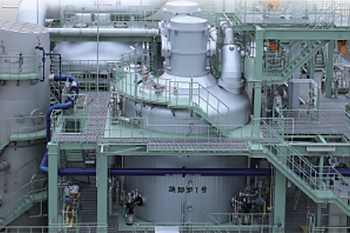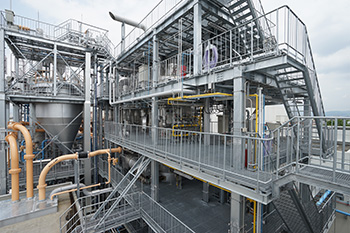Pressurized Fluidized Bed Incineration System
Structure and Principle
This pressurized fluidized bed incineration system combines a turbocharger (supercharger) with a fluidized bed incinerator. In this system, dewatered sludge is incinerated under a pressure of 150 kPa・G. Flue gas generated by the combustion is under pressure, so it flows towards the stack which is at low pressure, and it is introduced into a turbocharger through an air preheater and a dust collector.
The system does not need a forced draft blower and an induced draft fan which consume much electric power. So 40-60% of electric power and CO2 are reduced, and the system is self-driven without air supply and exhaust power if sludge is continuously supplied as fuel.
Academic awards (history)
- 17th Symposium on Fluidization & Particle Processing Award (Technical Division) (Nov. 2011)
- The Society of Chemical Engineers, Fluid and Particle Processing Division Technology Award (Jan. 2012)
- METI’* Award at the 41st Excellent Environmental Equipment Award hosted by the Japan Society of Industrial Machinery Manufacturers(JSIM) (Jul.2015)
*METI:Ministry of Economy, Trade and Industry - MLIT’s* Award at the 17th R&D Award by the Japan Institute of Country-ology and Engineering(Jul.2015)
*MLIT:Ministry of Land, Infrastructure, Transport and Tourism
Features
- Simple and compact structure
- Reduced electric power consumption (40-60% reduction)
- N2O emissions are reduced by high temperature and pressurized combustion


Related field & technology
- Sludge treatment facility
- Inclined disc dryer
The dryer adopts hollow inclined discs with the aim of obtaining a high heat transfer rate and raising the oscillation effect to a maximum.
